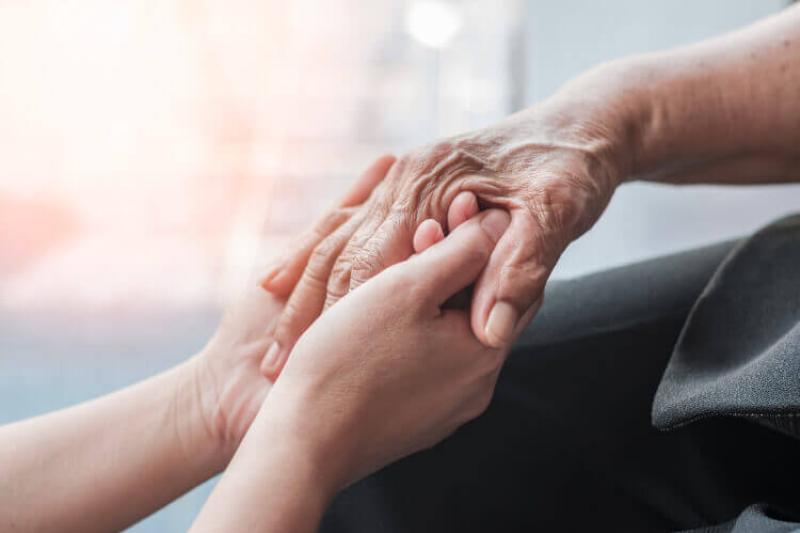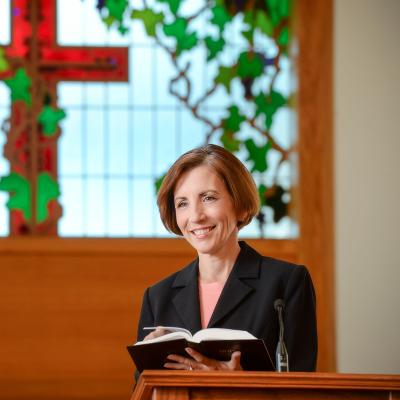- AdventHealth University

When it comes to patients’ needs, spiritual care — attention to a patient’s spirit and emotions — has just as much significance as medical and psychological care. Hospice chaplains offer comfort, guidance, and peace to patients by helping them understand their place within the context of humanity and their own spiritual journey.
Working as a hospice chaplain yields many rewards: Professionals can help patients and their families walk through some of the most difficult moments of their lives. A strong educational background, such as a Master of Science in Spiritual Care degree, can help individuals prepare for the responsibilities associated with the role of a hospice chaplain.
What Does a Hospice Chaplain Do?
Hospice care helps support the physical and emotional needs of patients who are terminally ill or nearing the end of their lives due to sickness, a chronic condition, or old age. Hospice chaplains work with other members of hospice teams, such as primary care providers, home health aides, counselors, and social workers, to counsel patients who desire spiritual care as they come to terms with the process of dying.
Chaplains often work with patients on the recommendation of a doctor who’s given a terminal diagnosis. A chaplain works hard to ensure that patients feel free to discuss their spiritual concerns, ask essential questions, realize the importance of their lives, and feel at peace as they near death. Chaplains also comfort the families of patients who are on hospice care.
Hospice chaplains don’t necessarily belong to a certain religion or denomination. They don’t preach sermons according to specific religious doctrines and don’t attempt to convert patients to certain belief systems. Instead, they have conversations with patients about their own spiritual thoughts and feelings. They help cultivate patients’ spiritual health and help them feel as comfortable as possible.
How Hospice Chaplains Help Patients
Patients struggle with physical and emotional pain as they deal with terminal diseases, such as cancer. In 2018, a doctor told his patient Pamela that treatment was no longer helping her or minimizing the growth of her liver cancer. The doctor recommended that she go home to be with her family members and loved ones during her last days, saying there was nothing more that he could do.
Even though Pamela could barely fathom what was happening, a hospice team stepped in and helped her transition back to her home. A chaplain met with her and her family members in the following days to help meet their spiritual needs and comfort them.
A hospice chaplain’s typical job responsibilities include the following:
- Regularly meeting with palliative care patients and documenting interactions
- Ensuring that a patient has ongoing access to family, friends, or other hospice team members to keep them company
- Taking part in a patient’s ritual or spiritual practice, such as prayer or meditation
- Addressing any questions a patient may have about spirituality
- Helping patients through the process of coming to terms with a terminal illness, a disease, loss of memory, or old age
- Encouraging patients to hold onto their beliefs, even though they may be experiencing feelings of doubt, anger, or fear
- Having meaningful conversations with patients about how their lives have value
Research studies show that patients who receive spiritual care in a palliative setting often feel less physical pain as they turn to spirituality for peace and comfort. Hospice chaplains foster safe spaces where patients can share their most intimate and vulnerable thoughts and feelings.
How Hospice Chaplains Help Patients’ Families
Hospice chaplains provide spiritual care to patients and their families and loved ones. Moving a family member from a hospital to palliative care or a hospice setting can cause fear, anger, confusion, or anxiety in children, spouses, and other family members.
In distressing situations, spiritual or religious individuals often question their faith. People who may consider themselves to be staunchly religious may find themselves struggling with their beliefs when a family member is about to pass away. Chaplains help spouses, children, and families work through the pain and grief of their loved ones’ illness by talking with them about spiritual coping practices or rituals. Some may be:
- Having conversations about spirituality with family members
- Praying
- Meditating
- Journaling
Chaplains can encourage family members, caregivers, and friends to hold onto their beliefs or explore different spiritual outlets as their loved one nears death.
Hospice chaplains also support families during the bereavement process after a patient has passed away. For example, they can:
- Help families contact a funeral service organization
- Offer grief counseling for family members
- Connect families with support groups or local churches
How to Become a Hospice Chaplain
Chaplains are medical and theological professionals who care for individuals’ spiritual needs. Professionals looking to become hospice chaplains can consider following these steps:
Step 1: Earn a Degree
Prospective chaplains typically begin by earning a bachelor’s degree in religious studies, biblical studies, or a related degree. They must also earn an advanced degree, such as a master’s degree in theology, spiritual care, or divinity.
Courses in these programs, such as the Spiritual Care and Chaplaincy, Cultural and Ethical Considerations in Healthcare, Grief and Loss, Organizational Mission Leadership, and World Religions for Healthcare Professionals courses offered by AdventHealth University Online, help graduate students prepare for the sensitive duties of chaplaincy.
Step 2: Gain Chaplaincy Certification
After gaining a firm foundation in the principles of spiritual care, prospective hospice chaplains often need to obtain certification. Accredited organizations including the Association for Clinical Pastoral Education offer clinical pastoral education (CPE) training programs that allow hospice chaplains to become board certified chaplains.
To qualify for certification from entities such as the Board of Chaplaincy Certification, individuals may need to receive an endorsement from their church or religious organization, complete four units of CPE, earn both a bachelor’s and master’s degree in theology or a related field, and gain clinical experience under the supervision of an experienced chaplain. Different organizations may have different requirements, but some may also prefer chaplains to become ordained ministers before working in hospice settings.
Step 3: Develop Essential Skills
Through the process of earning an advanced degree and becoming ordained, chaplains develop skills essential for hospice settings. Some include the following:
- Empathy and compassion
- Cultural awareness
- Inclusivity
- Mindfulness
- Ethics and respect
Salary and Job Outlook for Hospice Chaplains
According to the U.S. Bureau of Labor Statistics (BLS), the median annual salary for clergy members, including chaplains, as of May 2019 was $50,400. The salary can range based on a chaplain’s job location, education, years of experience, and organization.
The job outlook for clergy members, such as hospice chaplains, is projected to grow by 4%, or 9,700 jobs, between 2019 and 2029, according to the BLS.
Earn Your Master of Science in Spiritual Care Degree
Hospice chaplains help patients and their families at some of their most vulnerable times in life. If you’re interested in the process of becoming a hospice chaplain and addressing the spiritual concerns of patients in palliative or hospice care, consider earning AdventHealth University Online’s Master of Science in Spiritual Care degree. Learn more about how the program can help you have a meaningful impact on the lives of countless patients and their loved ones.
Recommended Readings
AdventHealth University’s Master of Science in Spiritual Care Gains Important Accreditation Affirmation
How to Become a Chaplain
Religion and Healthcare: The Importance of Cultural Sensitivity
Sources:
Association for Clinical Pastoral Education, Programs
Association of Professional Chaplains, Common Qualifications and Competencies
Crossroads Hospice Charitable Foundation, What Is a Hospice Chaplain?
Memorial Hermann, Chaplaincy and Spiritual Care
PayScale, Average Hospice Chaplain Hourly Pay
Santé, What Does a Hospice Chaplain Do?
U.S. Bureau of Labor Statistics, Clergy
U.S. Bureau of Labor Statistics, Data for Occupations Not Covered in Detail


